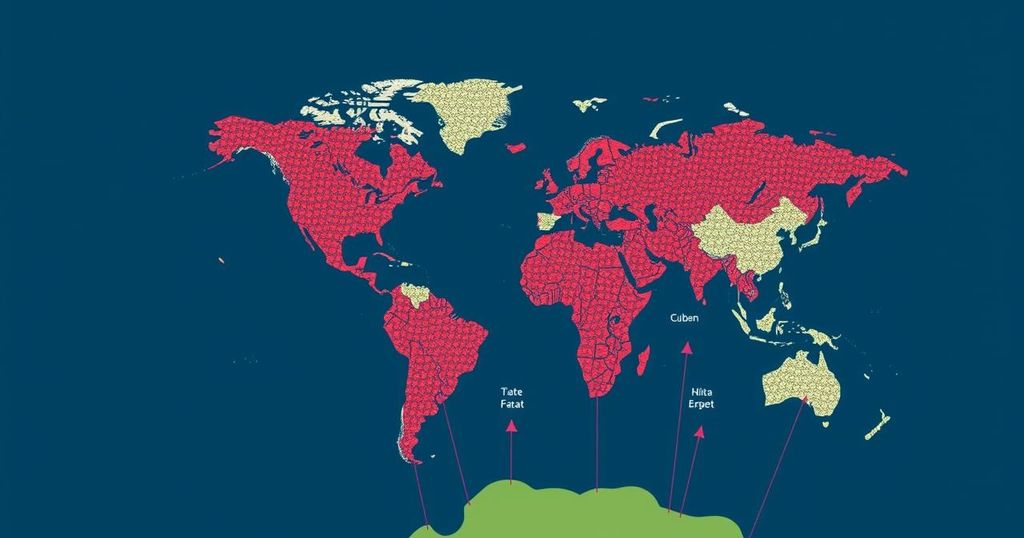World news
AFGHANISTAN, ASIA, BIDEN, CUBA, DEMOCRAT, DONALD TRUMP, EUROPE, FLORIDA, HAITI, HOMELAND SECURITY, KAMAL, KAMALA HARRIS, LEGISLATION, MEXICO, NAREE KETUDAT, NATIONAL SECURITY, NICARAGUA, NORTH AMERICA, PHILIPPINES, POLITICS, PRESIDENTIAL ELECTION 2024, PRESIDENTIAL ELECTIONS, SOUTH AMERICA, SOUTH FLORIDA, U. S, UKRAINE, UNITED STATES, VENEZUELA, WASHINGTON, WLRN
Ethan Kumar
0 Comments
Biden Administration Terminates Temporary Legal Status Program for Migrants
The Biden administration will not continue a two-year program providing legal status to migrants from Venezuela, Haiti, Cuba, and Nicaragua, affecting hundreds of thousands in South Florida. As new legal pathways are explored, individuals at the two-year mark risk deportation without alternative status. This decision occurs in a political climate of heightened scrutiny over immigration ahead of the 2024 presidential election.
The Biden administration has announced that it will not extend a program that provided temporary legal status to migrants from Venezuela, Haiti, Cuba, and Nicaragua who entered the United States with sponsorship. This program, initiated in 2022, aimed to offer a legal pathway for these migrants amidst a crackdown on illegal border crossings. It was particularly beneficial for these communities in South Florida, which represent the largest populations of these nationalities in the nation. The program enabled approximately 214,000 Haitians, 117,000 Venezuelans, 111,000 Cubans, and 96,000 Nicaraguans to live and work in the U.S. while seeking other legal status. As the 2024 presidential election approaches, this decision is significant, especially as it coincides with the ongoing political tensions surrounding immigration policy. Homeland Security officials have emphasized that individuals who have reached their two-year limit must apply for alternative legal status, leave the country, or risk deportation. Existing pathways include avenues such as “temporary protected status” for eligible Venezuelans and Haitians, allowing them to remain in the U.S. due to adverse conditions in their home countries. The spokesperson for Homeland Security, Naree Ketudat, highlighted the original intent of the program: “This two-year period was intended to enable individuals to seek humanitarian relief or other immigration benefits for which they may be eligible, and to work and contribute to the United States.” This decision underscores the complexity of the current immigration landscape as new migrants continue to arrive at the U.S. border seeking opportunities. Furthermore, the program’s cessation does not impact individuals from Afghanistan or Ukraine, who have different considerations under U.S. immigration policy.
The article discusses the Biden administration’s recent decision not to extend a two-year temporary legal status program aimed at migrants from Venezuela, Haiti, Cuba, and Nicaragua. Launched initially in 2022, the program was introduced as a strategy to manage the influx of these populations at the U.S.-Mexico border while simultaneously enforcing stricter immigration controls. This policy development is critical in the context of rising political scrutiny surrounding immigration ahead of the upcoming presidential election.
In summary, the Biden administration’s termination of the two-year legal status program for migrants from Venezuela, Haiti, Cuba, and Nicaragua carries profound implications for these communities, primarily located in South Florida. As these individuals face potential deportation, the administration’s focus on immigration policy continues to be a contentious issue in the political arena, particularly with the presidential election on the horizon. The current landscape emphasizes the urgency for alternative legal pathways amid ongoing concerns about immigration enforcement.
Original Source: www.wlrn.org




Post Comment